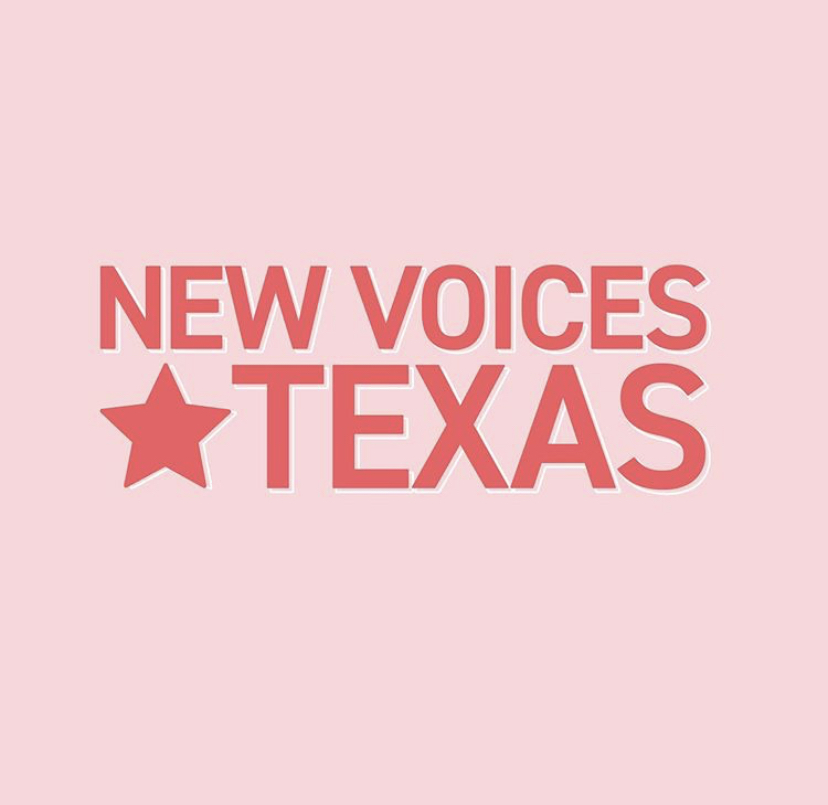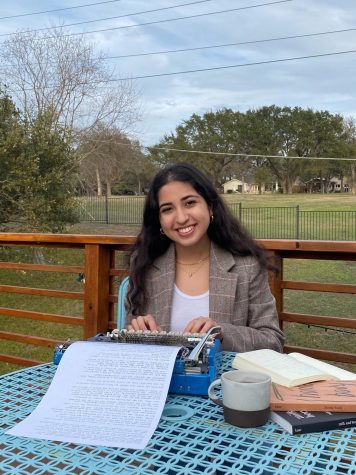New Voices Texas Advocates to Stop Censorship of Student News
Opinion
New Voices Texas
New Voices Texas is a student-led movement that strives to amplify the voices of student journalists and advocate for strengthened First Amendment rights for high school and collegiate level student journalists. Photo Courtesy of New Voices Texas
September 18, 2020
In the preservation of democracy, we seek our knowledge from the press. We live in a highly polarized climate, so we must be aware of biases in the news we consume. The exercise of the press is valuable, and when students use their abilities to produce quality journalism, we can witness the forming of the next great journalists upholding ethical and honest standards and doing so with accountability. In the world we live in where fear and misinformation can be filtered to us with ease, it is so critical, not only to our country but for the entire world, that corruption and prejudice are exposed and challenged and that bravery and morality are highlighted. Student journalism exemplifies the ideal of democracy in our nation, and establishes the notion of freedom of speech that we cherish and is synonymous with our nation. We must not take it for granted and instead protect and help to strengthen it.
New Voices Texas is a movement with other branches across the country that originated from the Student Press Law Center (SPLC), an informative source that acts as a legal aid for student journalists facing censorship. New Voices aims to serve as both a student-led advocacy group as well as an organized effort to help pass legislation that strengthens the rights of student journalists across the nation. Their lead advisor for the Texas chapter is Mr. David Doerr, a newspaper advisor at W. Charles Akins High School in Austin, Texas. A Texas team of officers, all high school seniors and one junior, are working to ensure New Voices is at its strongest for the 2021 legislative session.
“This legislation is so important because for students who work on censored publications you begin to teach yourself to self-censor. You don’t chase after the big stories, the controversial stories,” Mylo Bissell, the Legal Officer of New Voices Texas and a senior from Akins Early College High School, said. “So when a censored student goes from a high school publication to collegiate or professional journalism, they’re at a detriment because they have to unlearn the voice that tells them not to chase the lead.”
In many instances, student journalists feel undervalued and not properly recognized, unlike their adult counterparts. While accurately trying to report the ongoings of the world, they face censorship, prior review, and prior restraint. These are all forms of halting the publication process of student-led organizations. While some publications face enormous amounts of restrictions, others don’t. Across the country, student journalists are facing a different set of local and state laws which are differing, murky and unclear.
On the national level, court cases like the famous Hazelwood v. Kuhlmeier case (1988) established the idea that censorship, prior review, and prior restraint by school administrators could be enacted as long as the school administrators had, “legitimate pedagogical concerns,” to halt publication. However what is a, “ legitimate pedagogical concern?” The variations from case to case, school district to school district would be far too different to gauge. The idea of a public forum was introduced, citing that a school newspaper was in fact part of the school and not given equal privileges under the First Amendment as a public forum would provide. In a public forum, freedom of expression is protected under the First Amendment, but in a school newspaper, the school admin often dictates if something should be censored or not. Hazelwood reversed and altered decisions made in another well known censorship case, Tinker v. Des Moines, a Supreme Court Case of 1969, which ruled victoriously for the students. It established the precedent that students don’t, “shed their constitutional rights to freedom of speech or expression at the schoolhouse gate,” but that a, “material disruption,” to the school environment is grounds for possible censorship. But again that lack of clarity arises. For every school a, “material disruption,” can be quite distinct and limitations and rules are generally skewed in the favor of the school administration. With these uncertainties, student journalists are unaware or confused on their rights and legal limitations.
New Voices Texas has recently elected a leadership board with officers assigned to various tasks, aiding the increasing movement to support students journalists fighting for their rights to be protected equally and fairly under law as well as providing momentum. More than anything, the officers believe that the movement needs coverage. Back in 2019, New Voices proposed legislation that made its way into the House, House bill HB 2244, but it died in committee, and a similar Senate bill, SB 514, which was not put to vote. Despite a nearly unanimous vote balance in the House, its path to form law halted sooner than expected in the Calendars Committee. In the Senate, the bill wasn’t put to vote. In both the House and Senate several New Voices’ students testified. After testifying, members of The Texas Association of School Boards (TASB) registered against the bills. Timing was another roadblock in the way, as there wasn’t much time left in session before everything needed to be put to a vote. New Voices advocates will attempt to combat both these issues in the upcoming legislative session, by working hard to get their bill reviewed and put to vote early, even though that is largely not in their control. They also strive to get members of both political parties to align themselves with New Voices, arguing that this is not and should not be a partisan issue. They are working to get different supporters to back up their argument. But the voice of the students shines through the greatest.
This is another main point for the movement, striving to get more protection in place for journalism teachers and advisors. Advisors and teachers could face difficulties for contradicting the opinions of the school’s leadership, or even wanting to have a civil discussion and in some cases it can lead to their termination. Many school’s journalism programs can become neglected, left without a proper teacher.
“The way we are advocating through our legislation is by lobbying and raising awareness with campuses and school districts,” Bissell said. “The more people who see the kids this benefits and supports them, the more people will advocate for our bill with us.”
Last legislative session, the previous New Voices’ bills received backing from Rep. Mary Gonzalez (D) and Sen. Jose Rodríguez (D) who co-authored the House and Senate bill, respectively. However, since the last legislative session, a new slew of conflicts are facing the nation. The dire effects of the COVID-19 pandemic as well as a weakened economy might alter the priorities of the legislature. However, the team of student journalists with New Voices Texas are equipping for an altered campaign, likely free of in-person lobby days and discussions with representatives and prospective supporters of the bill. It is still largely unclear, as everything has changed quite rapidly to accommodate the effects of the COVID-19 pandemic.
“While our explicit goal is to stop censorship, we aim to do that so journalism students across Texas can become the investigative, bold, and determined journalists of tomorrow,” Bissell said.
Many schools are lucky enough to not have to face constant and unnecessary censorship. But the primary goal of New Voices is to ensure that students are all doing their work under the same, clear set of laws. The movement is expanding its influence, as 14 states have currently passed New Voices laws while others, including Texas, are attempting to do the same. The main objective of the movement is to promote and support ethical and high-quality journalism produced with integrity and honesty.
To aid the New Voices movement, there are several ways you can do your part. The Texas leadership board is working diligently on adding educational resources to the website to help both student journalists and other interested parties gain more information about why student press rights are critical and how they can help spread greater awareness. The SPLC is another great place to learn more about the various student press cases and the greater effort at large for what student journalists are advocating for.
No matter your political alignments, this issue should not be up to partisan debate. It is pertinent that as informed citizens of our nation, student journalists should have the means to be journalists, in the true and all encompassing sense of the word. It’s what fuels our democracy and empowers students to be knowledge, insightful, and worldly thinkers.
“I am so proud to be a part of this important non-profit,” Katlynn Fox, State Organizer Officer and senior at Hebron High School in Carrollton, Texas, said. “Because we are actively working to end censorship for all students and empower other journalists.”



